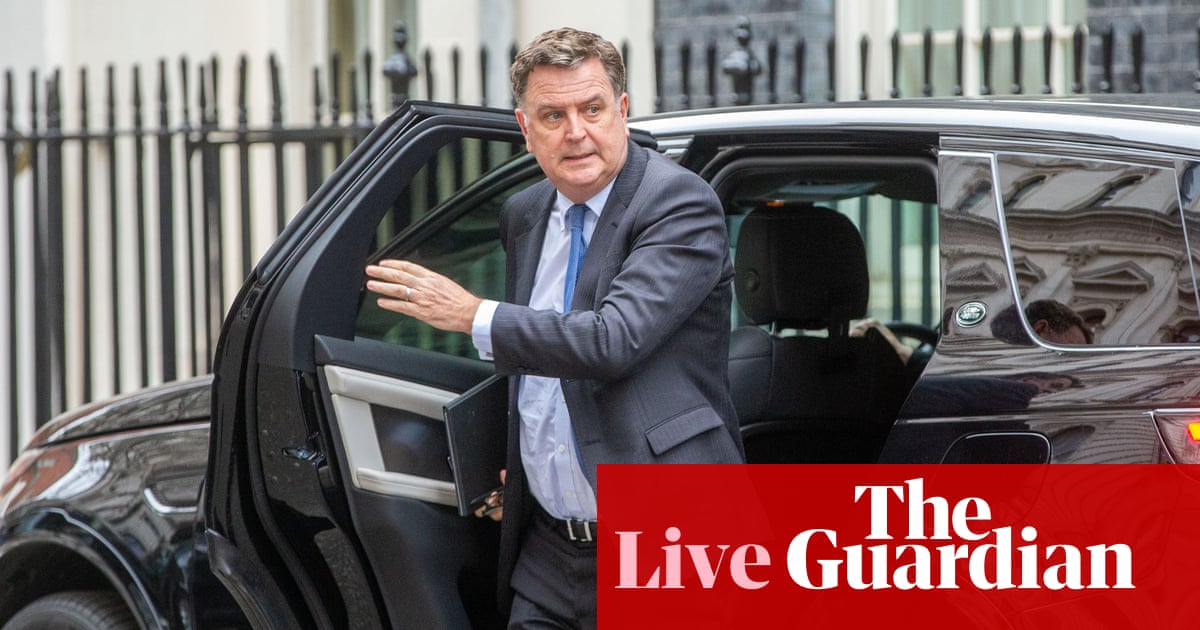Key events
Assisted dying bill to be introduced into House of Lords

Harriet Sherwood
Keir Starmer is under pressure to fulfil a promise to allow a parliamentary vote on legalising assisted dying as a bill is to be introduced into the House of Lords on Friday.
Lord Falconer, who was lord chancellor in Tony Blair’s government, will propose a private member’s bill to allow assisted dying for terminally ill adults after coming second in a ballot of peers last week.
In March, Starmer said he was in favour of changing the law. He promised Esther Rantzen, the television presenter who has terminal cancer and is campaigning for assisted dying, that if he became prime minister he would ensure parliamentary time to debate the issue and allow a free vote. He repeated the pledge after winning the general election.
But some advocates for a change in the law fear that the prime minister may decide to wait for a private member’s bill to be introduced in the Commons. A ballot of MPs is due to be held in September.
Starmer was committed to ensuring parliamentary time for a bill on assisted dying, said Falconer. But a Commons bill was a “much more certain route” than a bill originating in the Lords.
There were “a number of MPs who are keen to take this issue forward” if they were successful in a ballot, he told the Guardian. “It’s a significant social reform and it has a really good chance of success. It would be a bill for which an MP would be remembered. It might not be my bill, but I just want to get this through. And there is a sense now that the stars are aligned and a bill will get through one way or another.”
Falconer’s bill would allow terminally ill, mentally competent adults to have the option of assisted dying alongside access to high-quality end-of-life care. The individual would need to meet strict eligibility criteria, be assessed by two independent doctors, and self-administer the medication if their request was approved.
You can read the full piece here:
Kiran Stacey
Wes Streeting’s warning (see 9.49am BST) came after an interim report by the public care doctor Penny Dash found the Care Quality Commission (CQC) was plagued by low levels of physical inspections, a lack of consistency in assessments and problems with a faltering IT system.
Streeting has promised to “grip the crisis” at the CQC by taking immediate action to increase oversight of the body and give patients more confidence in their care.
He said:
How can you tolerate a situation where one in five of your health and care providers has not received a rating? How can you tolerate ratings being reached on the basis of only a partial inspection of the organisation, melded in with inspection reports dating back over a number of years?”
Streeting has announced four immediate steps the government and CQC will take to restore public confidence and give patients a more accurate picture, including recruiting a senior cancer doctor to review the body’s assessments.
Dash found that about a fifth of the locations the CQC had the power to inspect had never received a rating, while other organisations had not been reinspected for years. One inspection was about a decade old.
There was a lack of experience among inspectors, the report said, some of whom checked hospitals despite never having visited one before. Another inspector of a care home had never met a person with dementia.
Dash, who began her investigation in May, also found that social care providers were waiting too long for their registration and rating to be updated, with implications for local capacity.
You can read the full piece by Kiran Stacey and Pippa Crerar here:
Patients cannot trust CQC’s hospital safety ratings, says Wes Streeting
People should take what the Care Quality Commission (CQC) says “with a pinch of salt”, Wes Streeting has said.
The health secretary said he was “brutally honest” with the public before the election that problems with the NHS would “take time to fix”, but he had not anticipated that the regulator would have “failed to such an extent”.
Streeting told BBC Radio 5 Live:
I don’t think we need to manage the public’s expectations because to be fair to the public, whether it’s on the economy or the NHS or the other big challenges we’ve inherited, people know that they’re going to take time to fix. We were honest with people ahead of the election.”
He added: “I was brutally honest with people as the shadow health and social care secretary.”
On the problems faced by the NHS, he said: “It’s not going to be easy … things are worst than we expected.”
Asked whether he was saying that people should “not believe a word” of information they read on the CQC website, he said: “I’d say take it with a pinch of salt.”
Mel Stride has become the fourth Conservative MP to announce they are joining the race for the party’s leadership.
He told BBC Breakfast on Friday:
What we know from the general election is that we’re in a very, very difficult place as a party, and I worry about that because I care about my party and I care about my country.
We’ve substantially lost the trust of the British people and we’ve lost our reputation for competence, and I believe that I’m in a very good position to address those issues going forward.
In terms of trust, I think [the party] needs somebody who is going to be able to unite the party. People are not going to vote for a party that’s at each other’s throats all the time.
I am respected, I think, right across the parliamentary party. I was chair of the Treasury select committee, the leader of the House of Commons, all of those things are roles about bringing people together.”
Stride said he was “politically well placed” to unite the Tory parliamentary party. “My background is growing companies from scratch,” he told LBC. “I believe I have the right skills and approach to bring us to a point where we can get back into political contention.”
Stride retained his seat by just 61 votes at the general election.
You can read more on this story here:
Mel Stride becomes fourth Conservative MP to join party leadership race
Good morning and welcome to the Guardian’s latest UK politics live blog. I’m Amy and I’ll be bringing you updates today.
Mel Stride has become the fourth Conservative MP to announce they are joining the race for the party’s leadership.
The former work and pensions secretary told BBC Breakfast on Friday he has been “fully nominated” as a candidate, joining Tom Tugendhat, James Cleverly and Robert Jenrick in the race to replace Rishi Sunak as Tory leader.
Stride, the MP for Central Devon, said he believed he was the right person to “unite the party”.
Shadow communities secretary Kemi Badenoch, the bookmakers’ favourite to succeed Sunak, and former home secretaries Suella Braverman and Priti Patel are expected to put themselves forward before nominations close at 2.30pm on Monday.
Meanwhile, the chancellor, Rachel Reeves, is expected to share an update on a spending audit she ordered Treasury officials to produce. Her update will reveal “the true scale of the damage the Conservatives have done to the public finances”, a Labour source said, amid concerns over a black hole in the public finances of around £20bn.
In the House of Commons today, there will be a general debate on making Britain a clean energy superpower, while Keir Starmer is under pressure to fulfil a promise to allow a parliamentary vote on legalising assisted dying as a bill is to be introduced into the House of Lords on Friday.
Lord Falconer, who was lord chancellor in Tony Blair’s government, will propose a private member’s bill to allow assisted dying for terminally ill adults after coming second in a ballot of peers last week.
